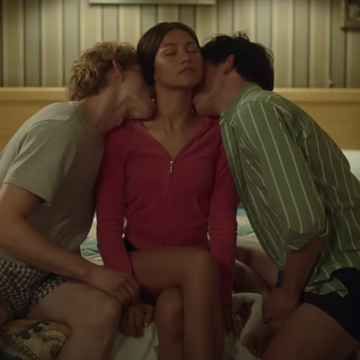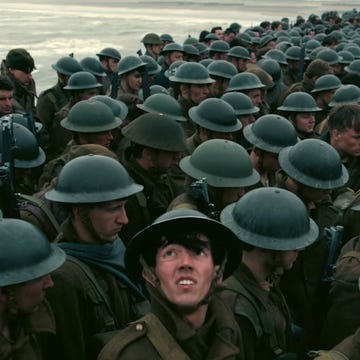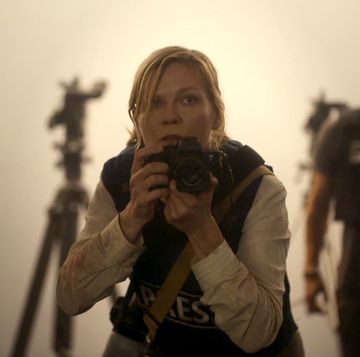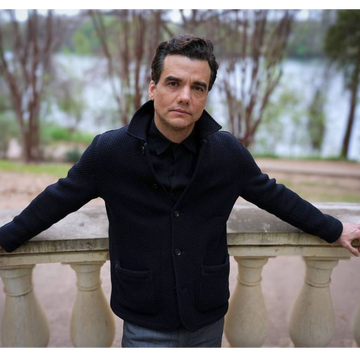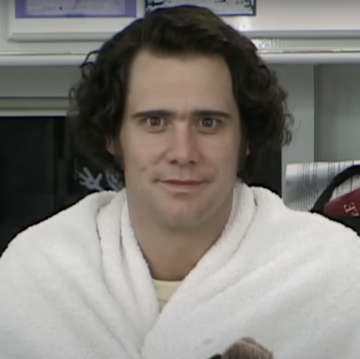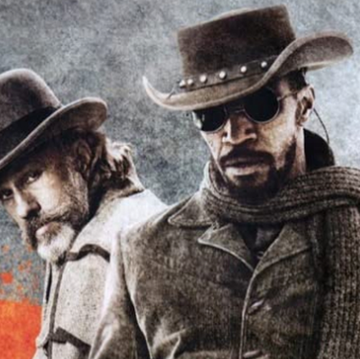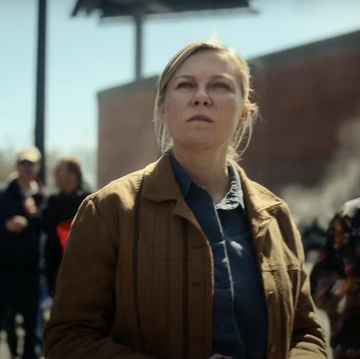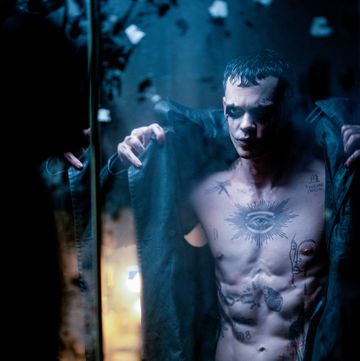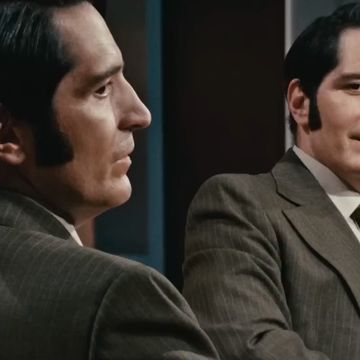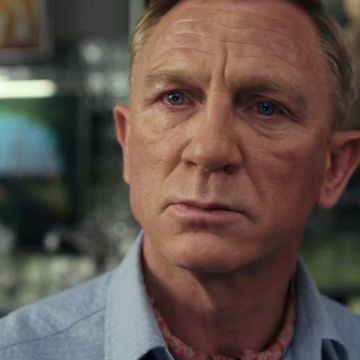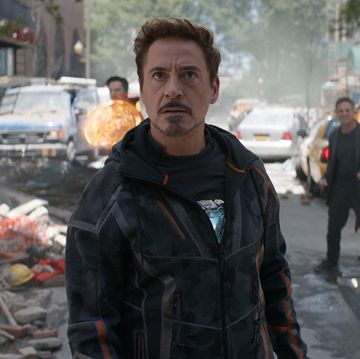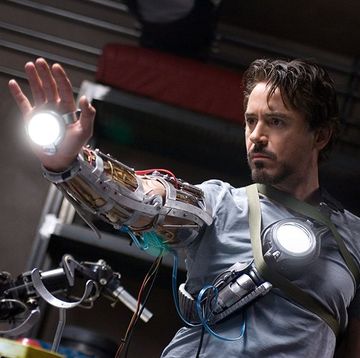Published in the August 2014 issue
Sunday brunch, the Red Cat, downtown Manhattan. The longtime collaborators have most recently worked together on Boyhood, which was filmed in short bursts over 12 years with the same actors, including Hawke; Ellar Coltrane, who plays the boy; Patricia Arquette, who plays his mother; and Lorelei Linklater (the director's daughter), who plays the boy's sister.
SCOTT RAAB: Where do you get the balls to take 12 years to make a movie?
RICHARD LINKLATER: When I first sat down and told Ethan about this idea, he got this weird look on his face. That's a crazy idea. He was in like that. Our commitment to this probably really informed the next two Before movies.
ETHAN HAWKE: Because we started seeing the power of longevity.
RL: This long-term project emboldened us, empowered us a little bit. These films ultimately are pretty optimistic, because you are saying, "I'm going to be here 12 years from now. And what we're doing will be relevant 12 years from now." It was weird to make a film that was a period piece in the moment knowing it's a period piece.
EH: One of the things that's the most arresting to me is seeing me smoke in a public place. And that already feels like What is he, out of his mind?
RL: Is he going to be arrested?!
EH: Smoking?! In front of his children in a public place?! That happened in that decade.
SR: I have a 14-year-old son. I cried just showing my wife the Boyhood trailer this morning.
RL: You see what's coming when they go off to college, right? A little preview. It's tough.
SR: And especially the mom's reaction. "I knew this day was coming. I just didn't think it would be so fast."
RL: I hate to break it down genderwise, but when my daughter went off to college, I was so happy for her. But the mom... They have given so much.
EH: The fun thing about Boyhood is that all of us were involved—Ellar, Lorelei, Rick, me, Patricia—to pour our thoughts on our own childhood and our thoughts on parenthood. Ellar and Lorelei are growing up, so they would offer what it's like to grow up right now. But Rick and I could talk about our experience as children of divorce. And I can talk about my experience as a divorced father.
RL: There's hardly anything in the movie that didn't originate in somebody's life.
SR: The experiences you chose to show aren't the clichés.
EH: We would sit there and ask, "Oh, what are some of the most important experiences you had with your father growing up?" Because what we're trying to avoid was things like losing your virginity, the day your dad got remarried... because those alleged important days are usually pretty obvious. And you don't have many interesting things to say about them. What I remember about growing up with my dad was camping. And him sitting by the fire playing guitar. And us making hot dogs. That is where the real glue of our relationship is: those weird moments when my dad wasn't at work, when he was free to be himself.
RL: This thing was an active collaboration—with our parents, our kids, ourselves at younger ages.
SR: Richard, people call your work naturalistic, which to me just means there's not a lot of acting. It feels like people are living their lives onscreen.
RL: You know how much work goes into those "naturalistic" performances? The 14-minute take? You can't do that without great actors. I take that risk because they can do it. I can't do that with everybody. Give them a little credit. You know how many weeks and weeks we rehearsed these things? You know how much work goes into it? If it was easy, everybody would do it. People still go, "Hey, you just kind of show up and improvise?"
EH: We've said it over and over again. And still, everywhere I go I hear, "I love those movies. You improv. You're funny."
RL: We were in a Q&A at Lincoln Center—remember?—where we just spent like four minutes answering the improv question. "We don't improv. It's all rehearsed and really worked out." Then three questions later, someone over there says, "You know, I like the improvisation."
SR: In Boyhood, there's a classroom scene in which the kids pledge allegiance to the Texas flag. Is there really such a pledge?
EH: Oh, for sure.
RL: Isn't that crazy?
SR: I can't believe it.
RL: That's a long time ago, but yeah.
SR: Did you both have to say it growing up in Texas?
RL: "Honor the Texas flag... one and indivisible."
EH: Texas was once its own republic.
RL: They still think that. The governor speaks openly about secession.
SR: You guys seem as if you're having a great time being interviewed. Most people don't enjoy this so much.
RL: If someone doesn't want to be there or something? What do you think they expect? Are they controlling?
EH: Or they've been hurt too many times.
SR: I get that.
EH: Allen Ginsberg realized really early in his life that more people would read his interviews than would read his poetry and that poetry doesn't really sell. So he took them incredibly seriously.
RL: He elevated his interviews to an art form.
EH: And gave the journalists the opportunity to meet him on equal ground. He would just give them his best. He would tell them the truth. He would say, "Yeah, I really enjoy having sex with young men. Let's just talk about the truth." And he said, Let the negativity come. The same ideas he was trying to articulate through his poetry he could also do through the interviews.
RL: I read his book of interviews more than I read his poetry.
SR: I didn't know such a book existed.
RL: It's really good.
EH: It's a compilation of interviews that follow from the first time he did an interview to the end of his life. Very few people who live a long time are that famous their whole life.
RL: Ginsberg never allowed himself to become irrelevant. "Oh, the Beat generation's over. I'll be a hippie now. We're going to love again. I'll be there. Haight-Ashbury is where it's at." He was in the middle of wherever it was going on.
EH: Even at the end of his life.
RL: Kerouac retires to his living room and his bottle. Just dispirited. All the negativity.
EH: Jealous of Ken Kesey.
RL: Self-righteous. You can always look at the world either way, you know?
SR: You're always referred to as a self-taught filmmaker.
RL: Whatever that means, yeah.
SR: That's what I want you to tell me.
RL: Are any of us self-taught? It just means I didn't go to school for it. But you do have teachers. You have mentors. You learn from everybody. Emerson said, "I will learn from everyone and be no one's disciple."
EH: It means that he's worked for everything he has. Nobody gave him permission to do it. He took it. Whenever you wait for the world to hand you these things—people who grow up affluent expect the world to deliver them. A lot of people will say, I want to be an actor. What they mean is they want to be famous. Or they say they want to be a director. What they mean is they want to tell people what to do.
RL: "Oh, I have a master's in film from USC..."
EH: "Now reward me."
RL: And the world doesn't give a shit. I knew that early. When you don't have privilege, you know at a young age that you are on your own. So you don't have any delusion that there's a thing you do and then the world gives you it. It keeps you kind of a student. Keeps you a little unaccredited.
SR: You've got no safety net.
EH: Parents sometimes ask me What can I do to help my child become a successful artist? I say, Abandon them.
RL: Give them a shitty childhood.
SR: I think for stand-up, for writing, it's a very helpful thing.
RL: You know when you see a weird art project and somebody is building a thing out of toothpicks? You know how healthy that is?
SR: I think it's essential.
RL: It's essential. And we're all kind of medicating ourselves in different ways. Hopefully through art.
SR: How important is collaboration for doing good work?
RL: What's that Margaret Mead quote? Or it's attributed to her. "Never underestimate what a small group of people working together can accomplish." You see that in all fields.
EH: Have you guys read Phil Jackson's book Eleven Rings? He's really moved by Dennis Rodman. He takes up a large part of the book. Rodman was one of the more riskier things he did as a coach. But he saw the possibility of how powerful Michael and Scottie were becoming, how much they needed another powerful personality who wouldn't be intimidated and who didn't want to take shots.
RL: Who would be his own man but really wants to rebound.
EH: Phil's always quick to say this: People make a big deal about Michael winning those six championships. Dennis Rodman was averaging 16 rebounds a game. Phil found that he related a lot personally to Dennis. That Dennis was a hustler. He didn't have a lot of natural skills. And he thought he had some learning disabilities. He clearly loves him.
RL: He let him be his own man. I remember it was in the Finals. They had a day off, and he went and did a wrestling thing in Detroit for $250,000 or something.
EH: And Phil had no problem with it. He said, "Dennis is a grown man. He leads the life he wants to. And he's allowed to." What that did is fill Dennis with pride. And then Dennis said, "I'm my own man. I can do what I want to." And then he would come to practice on time.
SR: Seems like there's plenty of that collaborative mojo in Boyhood. I'm not sure it could have been made if there weren't.
EH: People think it's some weird, freaky endeavor. It really was simple. The kids came in and we played. And Rick and Patricia and I, when they were young, would have an agenda. We would try to incorporate the kids into the agenda. And as the kids got older, they became a part of that rehearsal project as well.
RL: It was a blessing to get a free ride for 12 years to just do what felt right for the story.
SR: How do you even sign people up to do this?
EH: We didn't get the contract until it was over.
RL: We're still catching up legally.
EH: Patricia and I couldn't sign a contract because we were basically agreeing to work for 12 to 14 years.
RL: Which is illegal.
EH: So it's just good faith that we are going to keep wanting to do it. Good faith regenerates itself.
RICHARD LINKLATER AND ETHAN HAWKE: THE DOSSIER
Dates of birth: July 30, 1960 (Linklater); November 6, 1970 (Hawke)
Which makes them, respectively: 53 and 43
Birthplaces: Texas. Houston for Linklater. Austin for Hawke.
Occupations: Director and screenwriter (Linklater); actor (Hawke)
Linklater progeny: One; Lorelei
Who happens to play: The older sister in Boyhood
Hawke progeny: Four; two with Uma Thurman and two with Ryan Hawke
Collaborative works: Before Sunrise, The Newton Boys, Waking Life, Tape, Before Sunset, Fast Food Nation, Before Midnight, and Boyhood
A story emblematic of the serendipity that allowed for much of Boyhood: Hawke: "So, I flew back for the weekend to do this scene and had to catch the last plane out of Austin. We're doing the bowling scene and Rick needs a shot of me responding to Lorelei throwing a strike in the same frame. And this girl is not bowling a lot of strikes. No criticism to her bowling. Camera's rolling. One bowl. Boom! Strike. I make my plane and we're back home safe."



